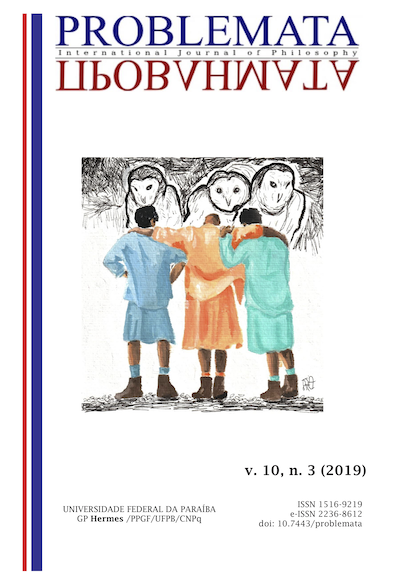AMOR MUNDI:
A RADICAL RESPONSE TO RADICAL POLITICAL DESPAIR
DOI:
https://doi.org/10.7443/problemata.v10i3.49132Keywords:
Amor mundi. Revolução Húngara. ArendtAbstract
The aim of this paper is to present an analysis about the meaning of the concept Amor Mundi in Arendt, particularly in the work The human condition (2014) in which the philosopher defines it. In order to accomplish this purpose, we will initially explain, in general, Arendt’s interpretative investigation, called “hunting pearls”, since it elucidates the use of the term by the author. Next, we evaluate the political implications of amor mundi as a sense of belonging, a disposition for coexistence, while taking responsabilty for the world. This disposition for coexistence was motivated by the Hungarian Revolution, an event that Arendt considers decisive to be at home, feeling as an integrated and edifying part of the world, amid the context of political apathy which culminated with the emergence of totalitarianism and also the “factories of corpses”in the concentration camps. The main references used were the Works The human condition and Action and pursuit of happiness.
Downloads
References
ALMEIDA, Vanessa Sievers de. Amor mundi e educação: reflexões sobre o pensamento de Hannah Arendt. 2009. 193 f. Tese (Doutorado em Educação) – Programa de Pós-graduação em Educação, Faculdade de Educação da Universidade de São Paulo, São Paulo, 2009. Disponível em: <http:/www.teses.usp.br/teses/disponiveis/48/48134/tde-08122009-160028/ptbr.php>. Acesso em: 29 out. 2018.
ARENDT, Hannah. A ação e a busca da felicidade. Rio de Janeiro: Bazar do Tempo, 2018.
______. Escritos judaicos. Barueri: Amarilys, 2016.
______. A condição humana. 12. ed. Rio de Janeiro: Forense Universitária, 2014.
______. Origens do totalitarismo. 3. ed. São Paulo: Companhia das Letras, 2012.
______. Sobre a revolução. São Paulo: Companhia das Letras, 2011.
______. “Sobre Hannah Arendt”. Inquietude, Goiânia, GO, v. 1, n. 2, p. 123-163, ago./dez., 2010. Disponível em: < https://inquietude.xanta.org/index.php/revista/article/view/45/Trad%20Arendt>. Acesso em: 29 out. 2018.
______. Compreender: formação, exilio e totalitarismo (ensaios). São Paulo: Companhia das Letras, 2008b.
ARISTÓTELES. Ética à Nicômacos. 3. ed. Brasília: Editora Universidade de Brasília, 1992.
DUARTE, André. Hannah Arendt e o pensamento político: a arte de distinguir e relacionar conceitos. Argumentos, Fortaleza, ano 5, n. 9, p. 39-62, jan./jun., 2013. Disponível em: <http://repositorio.ufc.br/bitstream/riufc/23745/1/2013_art_aduarte.pdf>. Acesso em: 29 out. 2018.
NUNES, Igor Vinícius Basílio. Amor mundi e o espírito revolucionário: Hannah Arendt entre política e ética. Cadernos de filosofia alemã: crítica e modernidade, São Paulo, v. 21, n. 3, p. 67-78, dez. 2016. Disponível em: < https://doi.org/10.11606/issn.2318-9800.v21i3p67-78>. Acesso em: out. 2018.
STARLING, Heloisa Murgel. Nota introdutória. In: ARENDT, Hannah. A ação e a busca da felicidade. Rio de Janeiro: Bazar do Tempo, 2018. p. 7-18.
YOUNG-BRUEL, Elisabeth. Por amor ao mundo: a vida e a obra de Hannah Arendt. Rio de Janeiro: Relume-Dumará, 1997.
Downloads
Published
Issue
Section
License
Authors who publish with this journal agree to the following terms:
- Authors retain copyright and grant the journal right of first publication with the work simultaneously licensed under a Creative Commons Attribution License that allows others to share the work with an acknowledgement of the work's authorship and initial publication in this journal.
- Authors are able to enter into separate, additional contractual arrangements for the non-exclusive distribution of the journal's published version of the work (e.g., post it to an institutional repository or publish it in a book), with an acknowledgement of its initial publication in this journal.
-
- Authors are permitted and encouraged to post their work online (e.g., in institutional repositories or on their website) prior to and during the submission process, as it can lead to productive exchanges, as well as earlier and greater citation of published work (See The Effect of Open Access).





